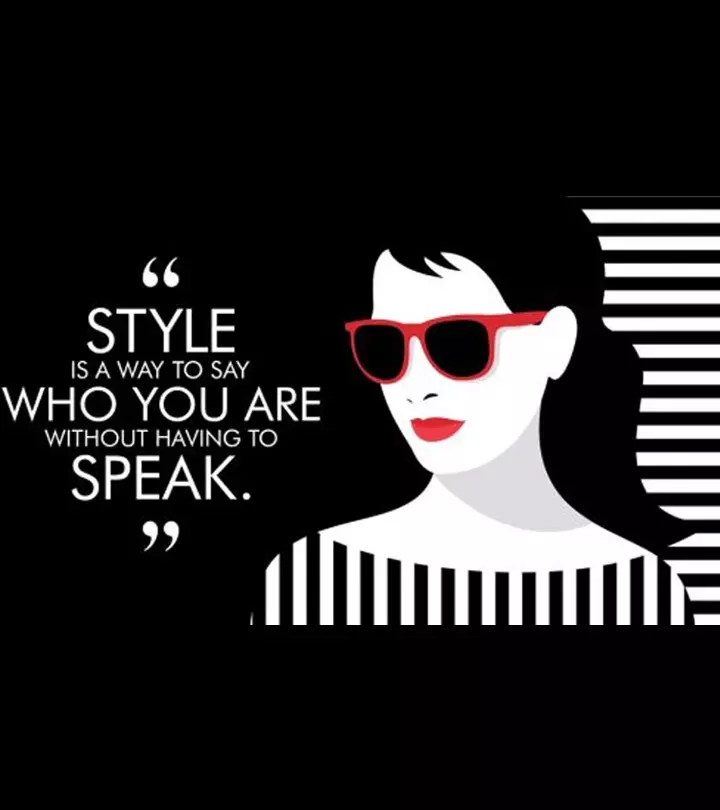Relationship Anarchy: Definition, Principles, & Methodology
A guide to help you navigate the nuances of a relationship that defies societal rules

Image: Shutterstock
Relationship anarchy – it sounds rebellious and edgy! It is an alternative lifestyle for people who practice non-monogamy peacefully. As the social construct of love is expanding beyond the binary, the way relationships are perceived is changing too. People with specific relationship needs and goals are looking for like-minded individuals and developing connections that are unique to them. Here is a comprehensive guide to explain understanding what such relationships look like! Keep reading to learn more about relationship anarchy.
In This Article
What Is Relationship Anarchy?
The concept of relationship anarchy, coined by queer feminist thinker Andie Nordgren, revolves around the philosophical idea that societal rules should not restrict our relationships (1).
Relationship anarchists tend to focus more on the relationship’s significance than getting stuck on specific titles, such as partner, friend, or spouse. In a relationship, anarchy stands for the freedom to customize. People should be allowed to reorganize the most meaningful relationships in their lives, whatever way they choose.
 Trivia
TriviaThere is no need for couples to rank romantic or platonic relationships, stick to one romantic partner, or marry the partner to get society’s approval. They do not feel like they ’owe’ the other person anything apart from the expectations agreed between the two parties.
The concept questions the traditional relationship set up and eliminates the restrictions posed on conventional relationships in many ways and forms. Its core values include freedom, communication, and non-hierarchy.
Now, let us dive deep to understand how relationship anarchy actually works.
How Relationship Anarchy Works In Practice
Relationship anarchy enables you to define your sexual or romantic relationships as per your core values. Both the parties involved take inspiration from their needs, wants, and desires to craft the relationship instead of bowing down to societal rules and norms. Here’s how this relationship strives to work:
- Seeks to blur the lines between platonic friendship and romantic relationship.
- Active practitioners do not succumb to ranking relationships in order of importance, based on love or sex.
- Tends to reject the traditional prioritization of romance over friendship or view monogamy as the holy grail for relationships.
A survey conducted on 1342 US individuals showed that 5% considered non-monogamy to be their ideal relationship style. Of these 6% were married and 5% were in a relationship. Additionally, 5% of the respondents were currently in a non-monogamous relationship while 12% had engaged in sexual activity with someone other than their romantic partner with their consent.
Here are the core tenets of the Relationship Anarchy Manifesto created by Andie Nordgen. Let us quickly go through it to help you seamlessly navigate this seemingly complex relationship style.
The Relationship Anarchy Manifesto
The Relationship Anarchy Manifesto found its beginnings way back in 2006 when Andie Nordgren published a pamphlet called ’The Short Instructional Manifesto For Relationship Anarchy.’ Here’s what it states:
1. Love Is Abundant And Every Relationship Is Unique
This questions the idea that love is a limited resource that can only be real if restricted to a couple. In simpler words, you can love more than one person.
It highlights that the love you feel for one person in no way reduces the significance of the love that you feel for other(s). This concept asks you to avoid ranking and comparing one relationship with the other as every relationship is important and independent of the others in its unique way.
A blogger expresses her heartfelt feelings regarding relationship anarchy and why she feels that it is necessary to have freedom in a relationship. She wrote, “I don’t know if I want multiple partners or just one, but I don’t want to restrict myself. I don’t want a cookie-cutter romance. I want to be comfortable being myself and being independent. That’s what I’m doing now and I’m not necessarily seeking a relationship right now, but if I do, I want it to be mutual in the idea that we can both or all be our own person (i).”
2. Love And Respect Instead Of Entitlement
This tenet explains that you need to respect others’ independence and self-determination. Controlling or coercing them is neither healthy nor practical. Do not overstep your boundaries. Instead, focus on understanding how to let the relationship flourish, keeping up its integrity. By staying away from entitlement and demands, you can be sure that the relationship is truly mutual.
3. Find Your Core Set Of Relationship Values
This involves the person asking themselves the following questions:
- How do you wish to be treated by others?
- What are your basic boundaries and expectations in relationships?
- What kind of people would you like to spend your life with?
- How would you like your relationships to work?
The end goal is to identify your core set of relationship values.
 Did You Know?
Did You Know?4. Heterosexism Is Rampant And Out There, But Do Not Let Fear Lead You
This tenet encourages you to stop worrying about what others might feel regarding your relationships’ validity, especially if you are not taking the standard route. Instead of fear driving your relationship, let mindfulness and positivity drive it forward.
5. Build For The Lovely Unexpected
This is all about being spontaneous and expressing yourself, without the fear of punishments or a sense of burdened “shoulds”.
6. Fake It Till You Make It
The underlying principle is to think about how you would like to see yourself act. You can use the ideas to create simple guidelines and stick to them when things are rough. Seek support from others who challenge the norms and gain strength when things get troublesome.
7. Trust Is Better
Instead of second-guessing your partner, it will help you if you choose to trust them. It leads you to a positive path and creates a supportive environment. This strategy enables people to talk, explain, and be responsible in the relationship. Always remember your core values, and you are good to go.
8. Change Through Communication
Communication and joint actions that drive change and break the stereotypical mold lie at the center of this tenet. It focuses on the fact that radical relationships must have conversation and communication at heart – not as a state of emergency brought out to solve “problems”. The more you communicate and be explicit, the better your relationship will be.
9. Customize Your Commitments
The final tenet focuses on trust and commitment between the two people for the relationship to work. It talks about designing your commitments with the people around you and freeing them from dictating norms and commitments that brand love to be ’real.’
As long as you are explicit about the kind of commitments you want to make, you will be able to navigate this type of relationship without any hassle.
Numerous misconceptions plague this concept. Scroll down to find out what they are.
Debunking The Common Misconceptions
- Incorrect Understanding Of The Relationship: When people hear the term ‘relationship anarchy,’ they often think of a lawless and chaotic state of affairs. While there are no set rules and norms to follow and you just make the rules along with your partner, always keep in mind the needs, wants, and desires of both parties.
- It Feels Like A ’Get Out Of Jail’ Free Card: Most people feel that the participants engaged in this relationship type get a ’license’ to do anything and everything without considering other people’s needs, wants, or desires. However, this is far from reality. On the contrary, relationship anarchy requires sincere work, dedication, communication, trust, and commitment.
So how does relationship anarchy fare against polyamory? Read below to know more.
Relationship Anarchy Vs. Polyamory
Relationship anarchy may be considered a radical version of polyamory. The most common type of relationship bonding is monogamy, which holds legal societal recognition. On the other hand, both polyamory and anarchy include non-monogamous relationships, involving sexual or emotional bonding with more than one person at a time.
Not to be confused with an open relationship, where couples are free to have multiple sexual relationships at a time for mostly a short-term period, in polyamory, you have a primary partner and have the informed consent of all the partners involved. This allows for the establishment of love and an intimate relationship with more than one person, but the primary is unchanged. On the other hand, in relationship anarchy, all partners are considered equal, and commitment is based on individual relationships.
Relationship anarchy is all about not sticking to societal rules that draw boundaries. They involve taking the liberty to customize them without the fear of being judged or the need to seek validation. Both the parties involved craft their relationship based on their desires, wants, and needs. It lightens the boundaries between a romantic relationship and a platonic friendship. In short, relationship anarchy, which helps get people closer and improve their bond, provides the liberty to create their own markers to lead their relationship on a successful path.
Thinking of plunging into this territory? Follow the relationship anarchy manifesto listed above and go with your instincts.
Frequently Asked Questions
Do anarchists believe in marriage?
Usually, anarchists don’t believe in marriage.
Can you be a relationship anarchist and monogamous?
Although many relationship anarchists tend to be non-monogamous, there is a possibility that they can be involved in monogamous relationships as well.
Key Takeaways
- Andie Nordgren, a queer feminist philosopher, invented the concept of relationship anarchy.
- Relationship anarchy goes against societal rules, focusing on both partners’ needs, wants, and desires.
- You can find specific core values in Nordgren’s Relationship Anarchy Manifesto such as ‘Love is abundant and every relationship is unique’.
- Common misconceptions about this lifestyle, such as living a chaotic life, are not true.
Find out what relationship anarchy actually means. Take a look at this video as the presenter explains the concepts of freedom and autonomy in relationships without predetermined limitations or boundaries. Click play to find more about this intriguing concept.
Personal Experience: Source
StyleCraze's articles are interwoven with authentic personal narratives that provide depth and resonance to our content. Below are the sources of the personal accounts referenced in this article.
(i). What Does Relationship Anarchy Mean To Me?https://thebabblingwriter.wordpress.com/2022/05/23/what-does-relationship-anarchy-mean-to-me/
References
Articles on StyleCraze are backed by verified information from peer-reviewed and academic research papers, reputed organizations, research institutions, and medical associations to ensure accuracy and relevance. Read our editorial policy to learn more.
- Trust jealousy and communication in long-term couples practicing consensual non-monogamy
https://scholarworks.smith.edu/cgi/viewcontent.cgi?article=2830&context=theses
Read full bio of Dr. Holly Schiff
Read full bio of Sneha Tete
Read full bio of Asmita De
Read full bio of Gracia Odile


























Community Experiences
Join the conversation and become a part of our empowering community! Share your stories, experiences, and insights to connect with other beauty, lifestyle, and health enthusiasts.